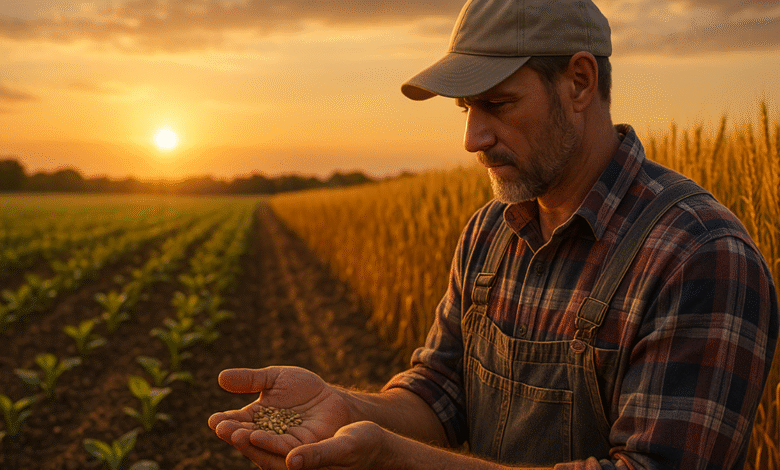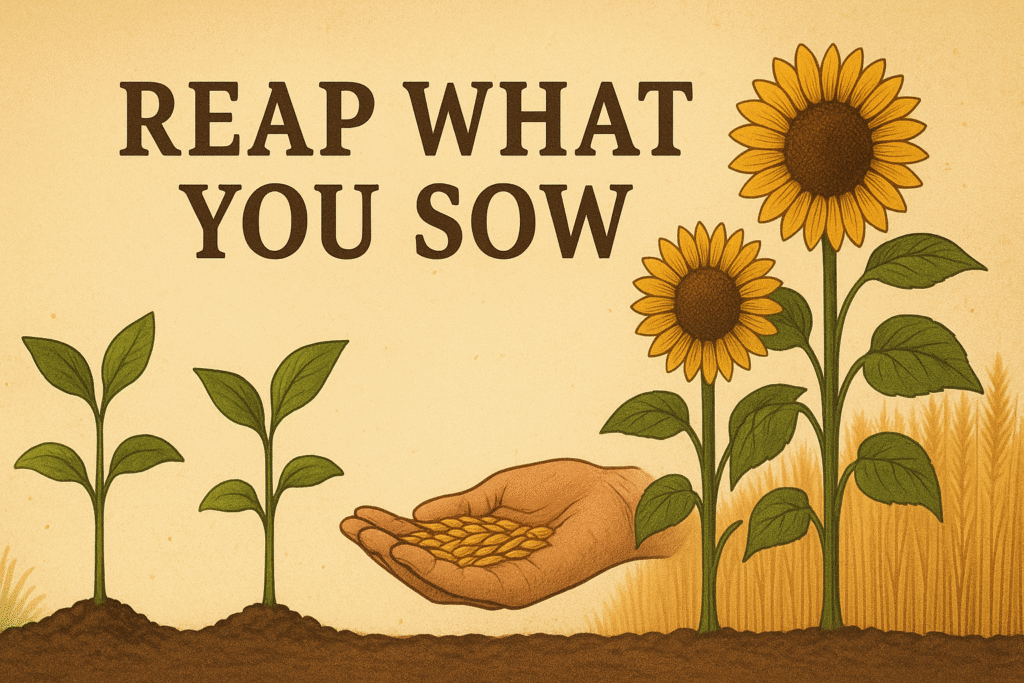Reap What You Sow: A Timeless Truth About Life and Choices

Discover the real meaning behind “reap what you sow.” Learn how this timeless principle shapes success, relationships, health, and personal growth. Practical, expert insights in a casual tone.
Introduction: The Seed and Harvest Principle
The phrase reap what you sow is one of those timeless sayings that cuts across cultures, religions, and philosophies. On the surface, it sounds agricultural—plant a seed and, in due time, you’ll gather the harvest. But beyond farming, this expression has become a guiding truth about life, choices, and consequences.
When you hear someone say you reap what you sow, they usually mean that your actions—good or bad—bring results that you must eventually face. The concept applies to relationships, work, money, personal growth, and even mental health. It’s a universal reminder that nothing happens in isolation; your present is shaped by what you planted in the past, and your future depends on what you’re planting right now.
The beauty of this principle is that it’s both a warning and a promise. If you sow carelessness, dishonesty, or neglect, you’ll reap hardship, mistrust, or regret. But if you sow kindness, discipline, and hard work, you’ll reap rewards, peace, and growth. That’s why understanding this phrase in depth can reshape the way you approach life.
The Origin and Meaning of “Reap What You Sow”
The phrase reap what you sow has ancient roots. It’s mentioned in the Bible, particularly in the book of Galatians: “For whatever a man sows, that he will also reap.” The original context was spiritual, teaching people that their moral and spiritual actions would determine their outcomes.
Over time, the expression moved beyond religious texts and entered everyday language. Farmers understood it literally: plant wheat, and you’ll harvest wheat. Plant weeds, and weeds will choke your fields. For ordinary people, the meaning became metaphorical. Your words, habits, and decisions are seeds—and your life is the field.
This duality of literal farming and metaphorical living makes the phrase powerful. It bridges the natural law of growth with the human law of cause and effect. No matter your background, the principle remains clear: you can’t escape the consequences of your actions.
Why “Reap What You Sow” Matters in Today’s World
In a fast-paced digital age, it’s easy to forget that actions have lasting impact. Instant gratification makes people believe shortcuts bring lasting success, but reality always catches up. The principle of reap what you sow reminds us that consistency and intention matter more than quick wins.
In business, unethical practices may bring short-term profit, but in the long run, they lead to scandals, lost trust, or financial collapse. In health, ignoring exercise and nutrition may not hurt today, but the harvest of that neglect often shows up years later. Relationships, too, mirror this law—neglect or disrespect plants seeds of resentment, while patience and love plant seeds of trust and connection.
The world changes, but the law doesn’t. Every choice you make, whether visible or hidden, is a seed. The question is, are you planting weeds or wheat?
Sowing Seeds in Personal Growth
Personal growth is one of the clearest areas where the phrase comes alive. If you consistently sow habits like reading, journaling, practicing gratitude, or learning new skills, you eventually reap a stronger, wiser, more capable version of yourself.
On the flip side, sowing procrastination, excuses, or negativity produces the opposite harvest. People who spend years doubting themselves often wake up one day realizing they’ve reaped stagnation instead of growth. This doesn’t mean it’s too late to change, but it highlights the importance of conscious planting.
The key is remembering that growth is a gradual harvest. Just like a farmer doesn’t plant seeds today and harvest tomorrow, personal development takes time. What you water and nurture daily determines your harvest months or even years from now.
Reap What You Sow in Relationships
Relationships are fertile ground for this principle. Every interaction is a seed, and what you put into your relationships determines the strength of your bonds. Sow respect, kindness, and loyalty, and you’ll likely reap trust, love, and long-lasting connections.
But relationships also expose the negative side of the saying. If you sow neglect, dishonesty, or selfishness, the harvest will be bitterness, distance, or even complete breakdown. Many people don’t realize that small daily actions—forgetting to listen, dismissing feelings, or failing to show appreciation—are seeds that grow into bigger problems over time.
Healthy relationships require intentional sowing. A kind word, a moment of patience, or a thoughtful gesture is like watering the soil. Over time, the harvest becomes resilience, intimacy, and connection that withstands challenges.
Career and Success: Planting Seeds of Hard Work
Success in any career is one of the most obvious illustrations of reap what you sow. No one becomes a respected professional overnight. Every late-night study session, every project done with integrity, and every small skill built over time becomes a seed. Eventually, these seeds yield opportunities, promotions, or recognition.
However, shortcuts, laziness, or unethical decisions plant very different seeds. Someone who constantly cuts corners may initially appear ahead, but the harvest comes later as lost credibility, missed chances, or outright failure.
The workplace, like a farm, rewards persistence. People who consistently show up, learn, adapt, and innovate eventually gather the kind of harvest others envy. The best part is, unlike farming where weather is unpredictable, your personal discipline gives you more control over your career harvest.
Health and Wellness: The Physical Harvest
When it comes to health, reap what you sow is almost literal. Your body records everything you do. Nourishing food, exercise, hydration, and rest are seeds that grow into strength, longevity, and vitality. On the other hand, years of unhealthy eating, neglecting fitness, or chronic stress plant seeds of illness that often show up when least expected.
The problem is that health seeds are invisible at first. You don’t feel the consequences immediately. That’s why many people ignore exercise or eat poorly—they don’t see the harvest yet. But time is the farmer that never misses. Eventually, the crop shows itself, and people realize they’ve been sowing neglect for years.
Taking care of yourself doesn’t have to be extreme. Small, consistent seeds like walking daily, drinking more water, or getting proper sleep can completely change the harvest of your future.
Spiritual and Emotional Growth

For many, the saying holds deep spiritual meaning. Faith traditions across the world emphasize sowing good deeds, kindness, and devotion as seeds that lead to spiritual peace and eternal rewards. Whether you approach it religiously or philosophically, the principle remains powerful: your inner life mirrors what you’ve been planting.
Emotional growth follows a similar path. If you sow bitterness, jealousy, or anger, you reap restlessness and broken relationships. But if you sow forgiveness, empathy, and gratitude, you harvest peace of mind and joy. The soul is soil too—it produces whatever you plant.
Everyday Examples of “Reap What You Sow”
To make this more practical, here are examples of how the principle shows up in real life:
| Seed You Sow | Harvest You Reap |
|---|---|
| Gossip at work | Damaged reputation |
| Daily learning | Career advancement |
| Neglecting exercise | Health issues |
| Consistent kindness | Strong relationships |
| Saving money | Financial stability |
| Dishonesty | Broken trust |
This simple table shows how clear the connection is. No matter the area, life gives back exactly what you put in—sometimes multiplied.
Quotes on “Reap What You Sow”
“Don’t judge each day by the harvest you reap but by the seeds that you plant.” – Robert Louis Stevenson
“Life is like a garden; you reap what you sow. Plant positivity, and your world will bloom.”
“Every thought and action is a seed. Choose wisely, because your harvest depends on it.”
Quotes like these make the principle easier to remember and apply in daily life.
Common Misconceptions About the Phrase
Some people believe reap what you sow means immediate punishment or reward. But that’s not always true. Seeds take time to grow. Sometimes people live recklessly for years before the harvest shows up. Similarly, those who sow discipline may not see results right away, but the harvest eventually arrives.
Another misconception is that the phrase only applies to morality. While it certainly includes ethics, it’s not limited to right or wrong. It also applies to effort, habits, discipline, and even mindset. A negative outlook plants seeds of defeat, while optimism plants seeds of opportunity.
Practical Ways to Sow Wisely
If you want to reap better outcomes, here are practical steps:
- Be intentional with daily habits—small seeds matter.
- Invest time in learning, even when results aren’t immediate.
- Treat others with respect, even when it’s hard.
- Take care of your body before it forces you to.
- Guard your thoughts—negative seeds produce negative harvests.
Sowing wisely is less about dramatic change and more about daily consistency.
FAQs on “Reap What You Sow”
Q1: What does “reap what you sow” really mean?
It means your actions, choices, and behaviors create results you’ll eventually experience. What you put out into the world comes back to you.
Q2: Does it always mean something negative?
No. It can be positive too. If you sow good habits, kindness, and hard work, you’ll reap positive outcomes like success, trust, and fulfillment.
Q3: How long does it take to reap what you sow?
Just like farming, it varies. Some seeds produce quick results, while others take years. Patience and consistency are key.
Q4: Can you change your harvest if you’ve sown bad seeds?
Yes. You can start planting better seeds today. While you may still face the consequences of past actions, new choices create new outcomes.
Q5: Why is this principle important in relationships?
Because small, consistent actions—like respect and kindness—build trust and intimacy, while neglect or selfishness erodes connection over time.
Conclusion: Plant Today, Reap Tomorrow
At its core, reap what you sow is not just a phrase but a life principle. It’s a reminder that your choices today shape your tomorrow. Whether in health, career, relationships, or personal growth, the seeds you plant will eventually rise into a harvest you can’t avoid.
The good news? You hold the power to decide what seeds to sow. By being intentional, consistent, and mindful, you can ensure your harvest is one of joy, success, and fulfillment rather than regret. Life is your field—plant wisely.





